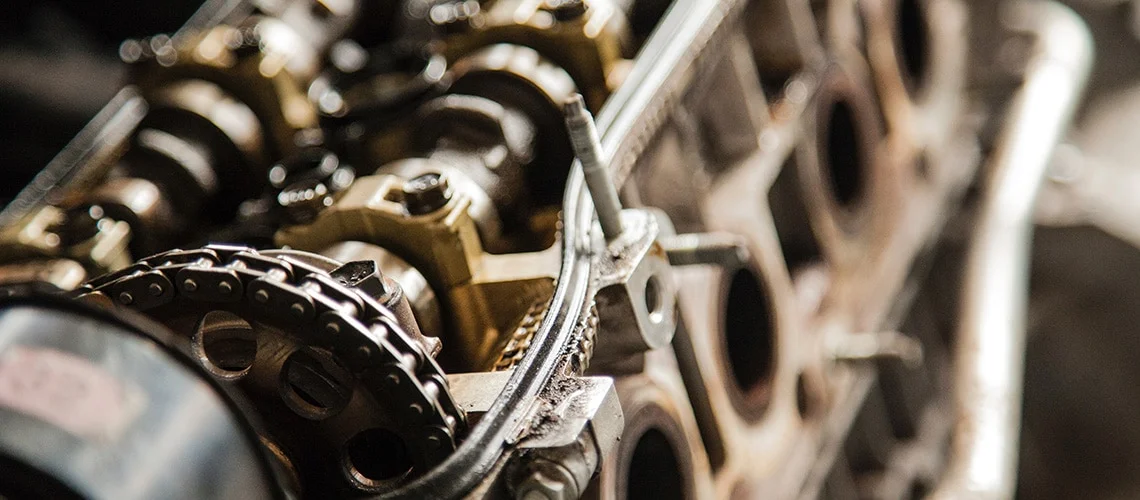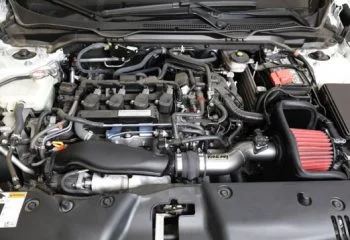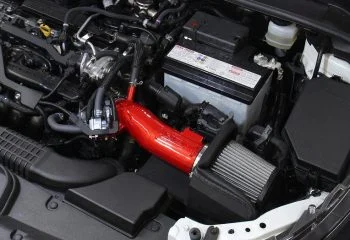No oil in your engine means no lubrication, and that spells disaster. You may be wondering how to tell if engine is damaged from no oil. It’s not always easy to spot the signs, but there are some things you can look for.
If you see any of these symptoms, it’s time to take your car in for a diagnostic checkup. Ignoring the problem could lead to even more damage and costlier repairs down the road.
So what are these symptoms, and how do you know whether your engine has been damaged from a lack of oil? Keep reading to find out!
What's in this post?
How to tell if engine is damaged from no oil? 6 Signs to watch for!
Oil Pressure Warning Light
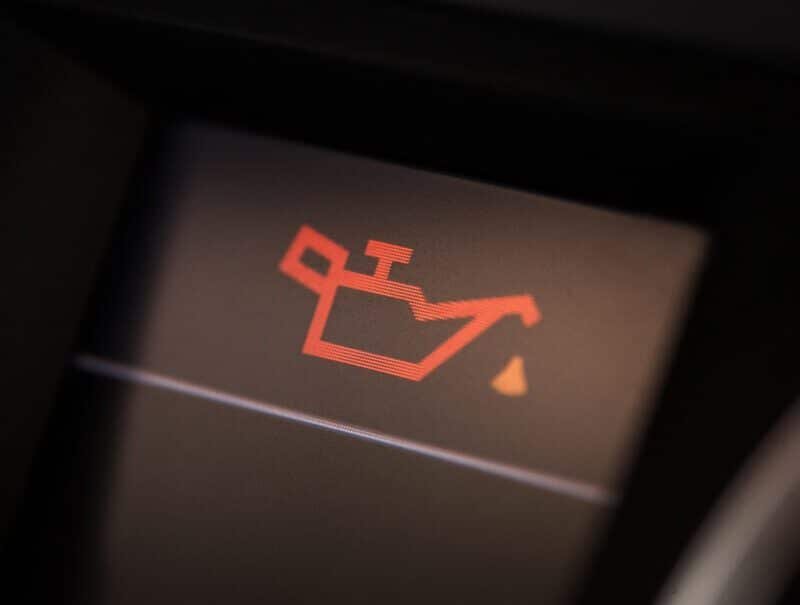
When you see the oil pressure warning light come on in your car, it is a sign that there is low engine oil and that action needs to be taken as soon as possible.
This can be due to many different factors, such as low oil levels, worn/damaged components within the system, or other issues related to the engine itself.
Regardless of the cause behind this problem, it is essential to address it quickly and correctly in order to prevent further damage to the engine and the rest of your vehicle.
If you notice that your low oil warning light has come on and you aren’t sure what steps to take next, be sure to consult your vehicle’s manual or seek out professional help from a mechanic.
With the right care and attention, you will be able to ensure your car continues running smoothly for years to come.
Read more: How to reset oil change light
Burning Oil Smell
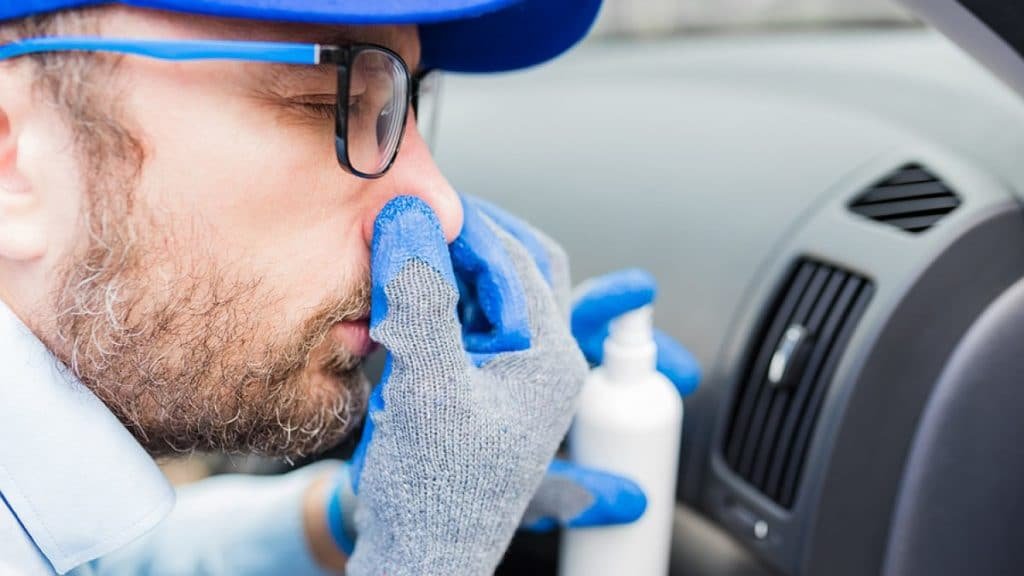
When you smell burning oil inside your vehicle, it is important to act quickly and take appropriate measures. This could be a sign of an oil leak, where oil may be dripping onto hot engine parts, causing the odor.
To prevent this from causing further damage to your vehicle, you should first pull over and turn off the engine as soon as possible.
Once your vehicle has had time to cool down, you can then check the oil level using the dipstick provided by your car.
If you find that the low engine oil level is lower than the minimum recommended amount, do not attempt to drive your vehicle any further.
Doing so could increase the risk of damaging your engine due to a lack of lubrication caused by low oil levels.
Overall, being vigilant about monitoring low engine oil levels and taking action when necessary is key for ensuring optimal performance and safety when on the road.
Unusual Noises
How to tell if engine is damaged from no oil when you heard unusual noises, It could be another problem!? When your engine’s oil level falls below a certain point, components may come into contact in such a manner that they make a clunking or knocking sound.
If you hear this sound, it’s important to check your oil level and add more if necessary. Continuing to drive with low oil can lead to engine failure.
So if you hear any unusual sounds coming from under the hood, be sure to get it checked out as soon as possible.
This could mean checking your oil level and ensuring that there is enough oil in your engine to keep things running smoothly.
If your engine oil level is low, you may need to add more oil or change the oil altogether to prevent further damage.
Maintaining an adequate level of engine oil is key for keeping your engine running smoothly and preventing costly repairs down the road.
Weak Performance
When there’s not enough oil in the engine, it has to work harder to lubricate all the moving parts. This can ultimately lead to overheating and decreased performance.
Additionally, low engine oil levels can cause premature wear and tear on the engine, as metal components will start to grind against each other without sufficient lubrication.
If you notice your car isn’t running as smoothly as it should be, it’s always best to stop and call a mechanic to have them take a look.
Trying to continue driving with low engine oil can do serious damage to your car’s engine.
Overheating Engine
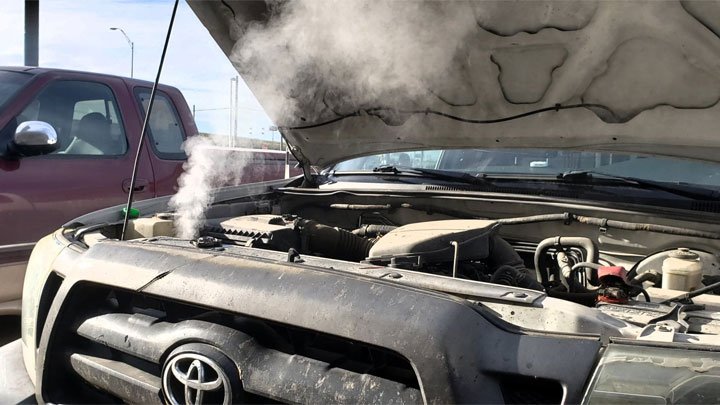
One of the most accurate signs that your oil level is low is overheating. When there’s not enough oil in the engine, it has to work harder to lubricate all the moving parts.
This can ultimately lead to overheating and decreased performance. Additionally, low engine oil levels can cause premature wear and tear on the engine, as metal components will start to grind against each other without sufficient lubrication.
If you notice your car isn’t running as smoothly as it should be, it’s always best to stop and call a mechanic to have them take a look.
Trying to continue driving with low engine oil can do serious damage to your car’s engine.
Smoking hood
If you notice a smoking hood while driving, it’s time to pull over and let your car cool down.
This is the most alarming sign that a fire is about to start, and at this point you won’t have any other option but to wait for help to arrive.
It’s important to be diligent and try to prevent the engine from reaching this stage, as it can indicate that some internal damage may have already occurred.
Either way, if you see a smoking hood, it’s time to call for professional assistance.
Low engine oil levels can contribute to this problem, so be sure to check your oil regularly and top off as needed. By taking these precautions, you can help prevent a potentially dangerous situation.
Engine Stops Working
One of the most important components of any car engine is its oil supply.
Engine oil acts as a lubricant, ensuring that all of the metal parts within the engine smoothly slide and glide across one another.
Without this low-friction layer, the metal surfaces within an engine would grind and scrape against one another, resulting in excessive wear and damage to the delicate mechanisms of the machine.
Eventually, these problems could even cause an engine to stall or fail entirely.
Therefore, it is critical for drivers to stay on top of their engine oil levels and keep their cars well-maintained by scheduling regular tune-ups and oil changes with a trusted mechanic.
When low engine oil levels are detected early on, they can be quickly rectified before causing further damage to your vehicle.
So if you notice any symptoms of low engine oil – such as sudden loud grinding noises or a loss of power – it’s crucial to stop your car immediately so that you can avoid accidents or additional repairs in the future.
What causes low engine oil?
If your car’s engine oil level is low, you may be wondering what the cause is. While there are many potential reasons for a low engine oil level, some are more common than others.
So, if your car’s engine oil level is low, keep reading! Here are some commom causes of low engine oil levels:
Oil leaks
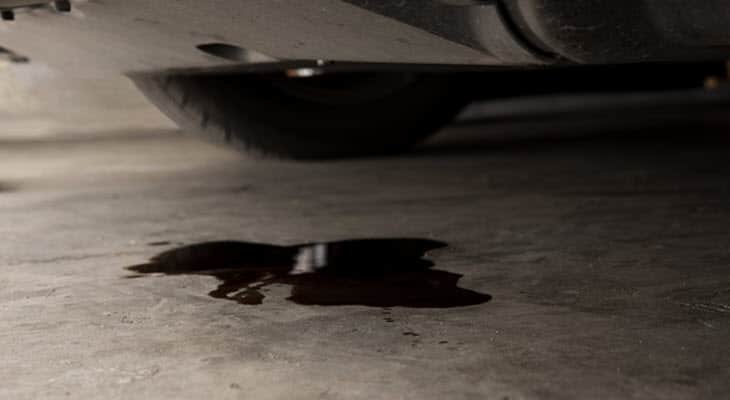
One of the most common causes of low engine oil is a leak. Over time, seals and gaskets can break down, allowing oil to seep out of the engine and causing low levels of oil in the system.
This can have dangerous consequences for your car, as low levels of oil not only increase wear and tear on your engine components but can also put you at risk for a breakdown or even engine failure.
To prevent low engine oil and to keep your car running smoothly, it is important to regularly check the oil level in your car and to fix any leaks promptly. With proper care and maintenance, you can keep your engine in top condition and enjoy a smooth ride for many years to come.
Bad oil filter
To keep your engine running smoothly and efficiently, it is essential to maintain a well-functioning oil filter.
The oil filter serves an important function in the system, acting as a trap and separating dirt, debris, and other particles from the engine.
When this filter becomes clogged or damaged in any way, it can have serious consequences for your vehicle.
For example, if your oil filter is clogged, then the warning light on your dashboard will activate to alert you that there may be leaks occurring in vital parts of the engine.
To prevent this from happening, it is important to routinely check and replace your oil filter to ensure that its performance remains optimal.
There are a few bad oil filter brands out there, so be sure to do your research before you buy one.
Incorrect oil level
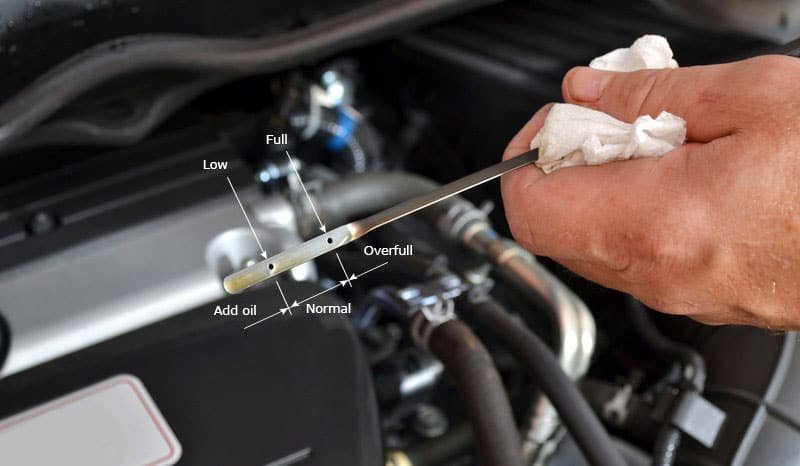
There are a number of potential causes of low engine oil, one of which is an incorrect oil level. This can occur during an oil change if too much oil is drained from the engine or if the new oil is not added to the correct level in the engine.
When this happens, there may not be enough lubrication for the moving parts in your engine, resulting in low engine oil and potentially causing damage to your vehicle.
To prevent this situation from occurring, it is important to monitor your oil levels carefully and to ensure that your mechanic correctly adds the right amount of new oil to your vehicle during each oil change.
By taking these steps, you can help protect your car from low engine oil and other damaging issues.
Oil pump defective
When the oil pump’s job is to transport oil from the pan, it ensures that there is enough pressure and when it fails, creates bubbles in the oil.
This can be due to a crack or hole in the pump itself, or in one of the hoses leading to and from it. The mechanic will need to take apart your engine to find and fix the problem.
Oil pumps are used in all vehicles to keep engine oil flowing during operation.
A faulty one can severely damage a vehicle’s engine, so it is important to have it checked regularly by a professional.
Excessive idling
If your car is idle for too long, the engine oil can break down and become less effective.
This can have dangerous consequences for the health of your engine, as low engine oil may not be able to effectively lubricate different parts of the motor.
Without proper lubrication, components in the engine can grind against each other, resulting in severe damage that could lead to costly repairs or even require a complete overhaul.
To prevent this from happening, it is important to make sure that you drive your car on a regular basis, even if it is just for short trips.
By ensuring that your car stays active, you can keep the engine healthy and avoid costly damage down the line.
Frequent short trips
If you frequently take short trips in your car, there is a high risk of low engine oil levels.
This is because shorter trips do not allow the engine to reach its optimal operating temperature. As a result, the oil breaks down more quickly, leaving you with less effective lubrication and increasing the likelihood of engine damage.
To prevent low engine oil levels and costly repairs, it is important to drive long enough distances each time you use your car.
Ideally, this should be at least a few miles or more, depending on where you live and the conditions on the road.
Additionally, it is also important to check your oil level regularly and to ensure that you use a quality brand that will withstand frequent use and heat exposure.
High mileage
As any car owner knows, low engine oil levels are a common problem for older vehicles.
This is because seals and gaskets tend to break down over time, leading to leaks that allow oil to escape from the engine.
In addition, the oil itself can become less effective as it breaks down due to heat and exposure to contaminants, such as dirt and road grime.
As a result, older cars may require regular oil changes in order to maintain proper fluid levels and prevent damage to the engine.
Luckily, there are many options available for keeping a car’s engine well-lubricated, including conventional motor oils and synthetic blends. So regardless of your car’s age or mileage, there is always a solution for low engine oil levels.
Wrong engine grade oil
When choosing engine oil for your vehicle, it is essential to consider the viscosity and density of the oil.
These two factors will affect how well the oil performs its vital function of lubricating the engine components.
For low-performance engines, you will typically need low-viscosity, low-density oil that can easily flow through small channels and provide just enough lubrication to keep everything running smoothly.
On the other hand, high-performance engines often require a thicker, denser oil that can withstand higher temperatures and pressures and provide more robust protection over time.
Overall, when choosing engine oil, it is important to consider your vehicle’s model and select an oil that matches its needs in terms of viscosity and density.
Additionally, you should be aware that used engine oil will often turn black over time as it becomes depleted of its lubricating capabilities. This is a normal part of the life cycle of engine oil and does not mean that you need to replace it immediately.
However, if your engine begins to run rough or show other signs of low lubrication, then this may be a sign that it’s time for a fresh batch of engine oil. In any case, always consult your vehicle’s owner’s manual for specific recommendations regarding maintenance.
If you’re experiencing any of these common causes of low engine oil, it’s important to take action as soon as possible.
Remember, low engine oil can lead to damage, so it’s crucial to keep your car well-maintained and top off the oil as needed. By taking these precautions, you can help prevent a potentially dangerous situation.
What damage can no oil do to an engine?
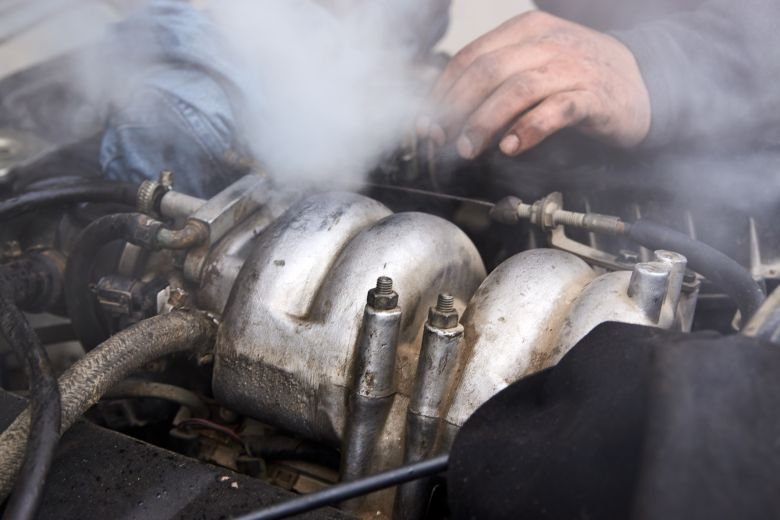
Having no oil can cause irreparable damage to your engine. The most significant of these damages typically include cracking the engine block or crankshaft, as well as wearing out cylinders and rods.
In extreme cases, an engine without sufficient lubrication may even completely seize up, rendering it inoperable. Therefore, it is critical that you take steps to protect your engine by ensuring that it has enough oil at all times.
An engine is a sensitive machine, and it relies on oil in order to function properly. While the engine can run for some time without oil, doing so will inevitably lead to serious damage being done to the motor and may even cause it to break down completely.
This is because the moving parts of an engine are constantly rubbing up against one another as they move at high speeds, and without oil to serve as a buffer between them, these components will cause excessive friction and wear and tear on one another.
Lubrication is essential for keeping an engine running smoothly and efficiently. Without enough lubrication, the engine will rapidly overheat, potentially resulting in a fire or other damage to the system.
Therefore, it is crucial that you ensure your car has enough oil for the engine in order to protect it from damage and keep it running smoothly.
Without proper lubrication, parts can become worn out or even seize up completely, causing major problems for the overall health of your vehicle.
So if you want to be sure that your engine lasts long-term and continues providing reliable performance, always be sure that you have sufficient levels of oil in your car’s engine.
How long does it take to damage an engine without oil?
If you’re noticing any signs that your engine is overheating, it’s important to stop driving and get it checked out as soon as possible.
Without adequate lubrication, engine damage is guaranteed within an hour of driving.
Even if you have some oil left in your engine, it will only provide protection for about 30 minutes.
Once all the oil is gone, damage can begin within a minute. When the oil light on your car turns on, it means that you should get to a repair station immediately.
Driving without oil should only be used as a last resort solution. Don’t risk damaging your engine – if you think there might be a problem, get it checked out right away.
Can you fix an engine that ran out of oil?
Yes, it is possible to fix a stalled engine with the proper technique.
There is no question that a stalled engine can be frustrating and stressful, especially when you find yourself on the side of the road or deep in a remote wilderness area.
The most important thing to do when your engine stalls due to lack of oil is to carefully add more oil to the engine as soon as possible, so that it can begin circulating again and heating up properly.
Specialists who have been trained in engine repair have several techniques that they can use to correct an engine that has run out of oil or become clogged.
For example, some may use a specialized oil flush to clear out any blockages and restore the correct level of lubrication.
Others might employ more invasive measures, such as removing critical engine components and replacing them with high-quality aftermarket parts.
Regardless of the approach used, a skilled technician will be able to get your stalled motor back up and running in no time!
So if you find yourself facing an engine that just won’t turn over, don’t panic – there’s always a solution! Also, make sure to clean your oil pan.
What happens if you start an engine without oil?
Starting an engine without oil can be dangerous. Without oil, the lubrication required by the internal components of your engine is lacking; this causes them to rub against each other as they move.
As a result, your metal parts become incredibly worn down and damaged much more quickly than normal.
This produces intense amounts of heat that eventually finds its way out as smoke from the tailpipe (if you’re lucky).
The most common outcome of starting an engine without oil is that it will run for about 15 minutes until it overheats and bursts into a cloud of smoke.
Although this may seem like a minor occurrence, taking apart a car that has been running without oil reveals shocking damage inside the cylinder walls and crankcase.
The friction caused by lack of lubrication destroys bearings, journals, pistons rings and cylinders—sometimes even causing serious crankshaft bending or twisting!
FAQs about how to tell if engine is damaged from no oil
Can I just add oil to my car?
To add oil, turn off the engine and wait for it to cool. Remove your vehicle’s filler cap slowly while making sure not too much spills out of its neck before pouring in some yourself!
If you overfill your car engine, it will not work as well. This means you will have to spend more time checking the engine than driving around.
To avoid this, be careful about what comes into contact with the engine when you fill it up. This is especially important when you are filling up through small openings like f drains.
Make sure to clean your oil pan after every oil change as well. It’s an easy process, if you don’t know how to do it, here is a guide on how to clean your oil pan.
How many miles can you drive a car without an oil change?
Oil changes used to be a required procedure every 3,000 miles. However with modern engine technology and the ability for cars go 5000 – 7000 miles before an oil change is necessary nowadays!
How long do I wait to check my oil after adding oil?
Make sure your engine is cool, and give it at least 20 minutes to drain all the way back into its sump.
Why does my dipstick shows no oil after oil change?
You can see that there is no oil on the dipstick when it’s cold because your engine used up more than usual between last time you changed the fluids and now. This could mean some sort of problem, like faulty parts for example!
Why is my engine burning oil so fast?
The burning of motor oil is often caused by worn parts. For instance, if your valve seals or piston rings have become too thin they may allow some combustion-chamber contents to enter into the fuel system which could result in car burned engines!
Should I check my oil when the engine is hot or cold?
You should check your engine oil when it’s cold and then again 15 minutes after the car has been running. This is because of how long oil takes to pour down into an empty pan, so by then being warm won’t really make any difference!
Why is my car losing oil but no leak?
The most likely cause is a defective PCV valve. This valve is responsible for preventing the natural flow of oil, and when it is not functioning properly, extra pressure is created in the cylinders.
This can cause oil waste and, in some cases, a burning accident. As a result, you will need to add more oil to your car than its natural demand.
If you suspect that your PCV valve is defective, it is important to have it checked by a qualified mechanic as soon as possible. Failure to do so could result in serious damage to your engine.
What happens if you mix old and new oil?
When you mix new and old oil, the newer oils become “watered down” with less of an ability to resist tension. This makes them easier for interfaces which can lead towards failure over time if not changed often enough!
Can you add oil to a hot engine?
You can put oil in your car when the engine is hot, but be careful not to overfill it. Once your house has cooled down, check if there is smoke coming out of any cracks.
If there is, someone might have been burning something in your house and you don’t want that.
If it’s okay, you can make some additions but only if they are warm or a little bit cool. Thermal expansion can cause leaks when the temperature is high so we don’t want that to happen.
Is my car leaking oil or transmission fluid?
If you notice a puddle of liquid near the front end of your car, there’s an easy way to find out what caused it.
Put some paper towel or finger into as far up in that vicinity and see if any oils come out – brown/black with a burnt odor will be engine oil!
What color is oil when it leaks?
The color of oil will depend on how old it is, with brown or black being typical for older oils. You may notice leaking directly under the engine compartment due to this darker hue coming from beneath your car’s hood/engine area.
Can you open oil cap after driving?
No, it’s too hot. When you’re about to start your car, make sure that the engine is not too hot before opening its oil filler cap.
You should wait 1-3 minutes for this particular type of vehicle and close it after finishing testing so as prevent any leaks or spills from occurring while driving on bumpy roads!
Can a head gasket leak oil?
Yes. If a cylinder head gasket has blown between the water or oil passage and the outside of the engine, there is a good chance that it will result in a coolant or oil leak.
Although this may seem like a less serious scenario than some other possible outcomes following a blown head gasket, it is still something that should be taken seriously.
Beyond damaging your engine and causing costly repairs, this kind of leak can also destroy your vehicle’s overall performance and increase your risk of an accident on the road.
Therefore, if you suspect that you may have a blown head gasket due to the presence of an oil or coolant leak, it is important to seek out professional repair assistance as soon as possible.
With the right tools and expertise, your mechanic can take care of any necessary repairs quickly and efficiently, so that you can get back on the road as soon as possible.
How full is too full on dipstick?
The dipstick is your guide to checking the engine’s oil level. It will have low and high marks, which indicate when it should be filled up or changed out for new fluid in most cases (a few exceptions exist).
If you see that there are 1-2 millimeters left over from where the car was designed with this measurement at gas stations IIRC – don’t worry about it.
However if its more than 3mm then I would recommend getting ready because something may need looking into!
Conclusion
So, if you’re not topping off your engine oil as you should, you’re causing damage that will cost more to repair in the long run. Not only does this mean more money out of your pocket, but it also means a decrease in your car’s performance and fuel efficiency.
We hope this article has helped you understand how to tell if engine is damaged from no oil and what to do if you think your car may be experiencing problems.
Remember, prevention is always the best solution so be sure to keep up with oil changes and other necessary maintenance tasks to avoid costly repairs down the road.

